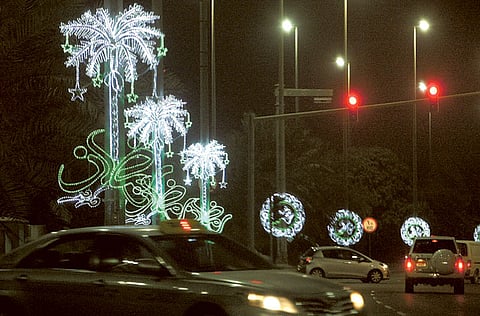Ramadan moon sighting on Monday night
The committee will meet after Maghrib prayers to sight the crescent moon of Ramadan

Abu Dhabi: A committee, chaired by Dr Hadef Jua’an Al Daheri, Minister of Justice, will meet after Maghrib prayers on Monday at the Abu Dhabi Judicial Department, to sight the crescent moon of Ramadan.
With the onset of Ramadan, Muslims in the UAE will join the entire Muslim nation of almost two billion people, men and women, young and old, rich or poor, for a whole month, not eating, not drinking and not having intimate relations from dawn to sunset.
The Fatwa section of the General Authority of Islamic Affairs and Awqaf said for those who miss any days of fasting during Ramadan, there are two types of missed fasts. For any days missed through necessity, Fidya is payable. For any days missed unnecessarily, Kaffara is payable.
When someone cannot fast in Ramadan and cannot make up afterwards (due to ill health or pregnancy) they pay Fidya for someone else to be fed at the rate of Dh15.
Scholars say Kaffara is the compensation that a Muslim should give if they deliberately miss or break a fast in Ramadan without a valid reason.
According to scholars, to atone for the missed/broken fast, someone must either fast continuously for 60 days, or feed 60 poor people at a rate of Dh15 per day per person. This amounts to Dh900 Kaffara for each missed/broken fast.
Allah states in the Quran:
“O believers! Fasting has been prescribed for you as it was prescribed for those before you in order that you become more conscious of God.”
Fasting in Ramadan is obligatory for each and every sane adult Muslim. As for a child, it is not obligatory upon him or her, although valid if observed by a person at the age of discretion (mumayyiz). Also essential for the validity of the fast are Islam and intention. Therefore, as per consensus, neither the fast of a non-Muslim nor the fast of one who has not formed the intention is acceptable. This is apart from the conditions of freedom from menses, bleeding following childbirth, illness and travel.
A traveller fasts and ends the fast according to the timing of the place they reached at dawn and sunset, regardless of the timing of the starting point or destination.
For a traveller to break the fast, the Hanafi, Hanbali, Shafi’i and Maliki schools add a further condition, which is that the journey should commence before dawn and the traveller should have reached the point from where the prescribed prayer becomes overdue before dawn. The Shafiis add another condition, which is that the traveller should not be one who generally travels continuously, such as a driver. In the opinion of all four schools, ending the fast is optional and not compulsory.
Therefore, a traveller who fulfils all the conditions has the option of fasting or not fasting. This is despite the observation of the Hanafis that performing the prescribed prayer in the shortened form during a journey is compulsory and not optional.
The Fatwa section of the General Authority of Islamic Affairs and Awqaf has said that iftar zakat is Dh20 per person
In Islam fasting is primarily to bring one closer to Allah.
Since, Allah-consciousness is the prerequisite for righteousness, great stress is placed on fasting in Islam.
Therefore, it is not surprising to find that when Prophet Mohammad (PBUH) was asked “Which is the best deed?” ,he replied, “Fasting, for there is nothing equal to it.”



